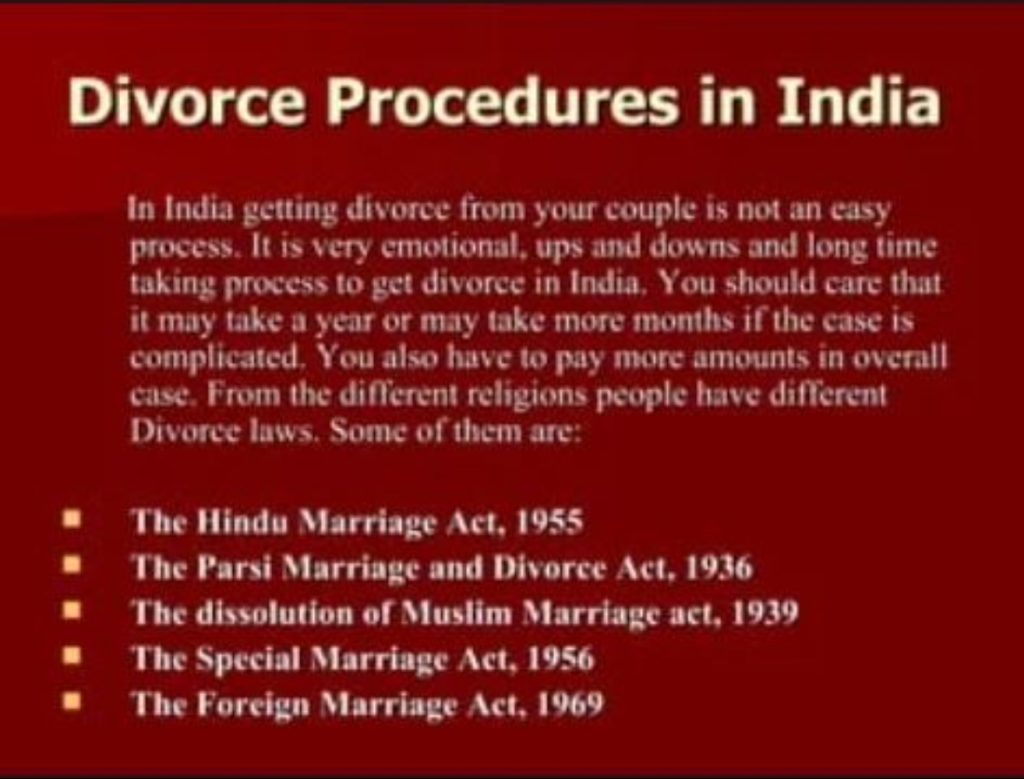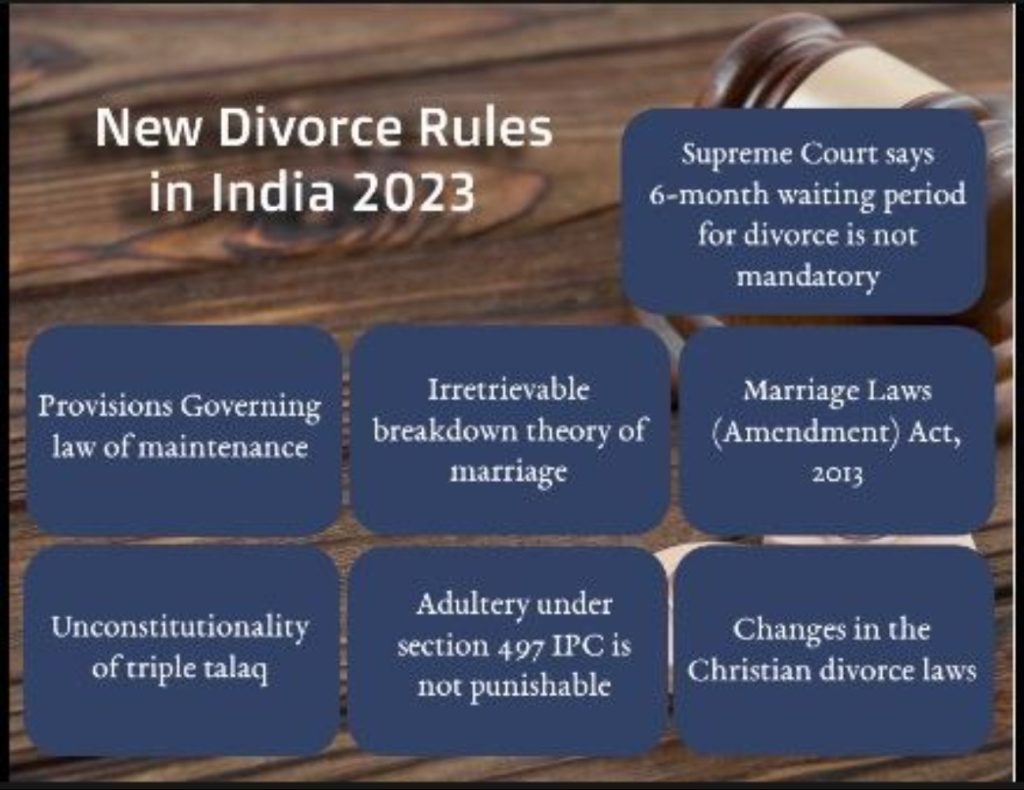Understanding Family Law in India is a complex task, and one must take help from a professional lawyer for speedy disposal of disputes.

Divorce, an emotionally challenging process, is governed by specific legal frameworks in different parts of the world. In India, a diverse and culturally rich nation, divorce laws vary based on religious beliefs, personal laws, and regional regulations. To subscribe please click tau.id/2iy6f and access our live channel.
MUST READ: World Autism Awareness Day 2024
The Indian Divorce Act
The Indian Divorce Act was drafted into the Indian legal system in the year 1869. In India divorce rules and procedure varies according to the community of the couple. As stated above divorce among Christians is governed by the Indian Divorce Act, 1869, Hindus, Buddhists, Sikhs and Jains by the Hindu Marriage Act, 1955, Muslims by the Dissolution of Muslim Marriages Act, 1939, Parsis by the Parsi Marriage and Divorce Act, 1936 and the civil and inter-community marriages by the Special Marriage Act, 1956. The State of Jammu and Kashmir is excluded under the ambit of this divorce Act, though residents domiciled in other states but residing in Jammu and Kashmir would qualify for these rules and provisions.
Understanding The Intricacies
- Hindu Marriage Act, 1955: Under this act, grounds for divorce include adultery, cruelty, desertion, conversion to another religion, mental illness, and incurable diseases. Additionally, mutual consent divorce, introduced in 1976, allows couples to dissolve their marriage amicably if they have lived separately for one year or more.
- Muslim Personal Law: The dissolution of marriage among Muslims is primarily regulated by the Sharia law, which recognizes three forms of divorce: Talaq, Khula, and Mubarat. Talaq, the most common form, allows a husband to divorce his wife by pronouncing ‘Talaq’ thrice, with certain conditions and waiting periods. Khula permits a wife to seek divorce by mutual consent or through a judicial process, typically involving financial negotiations. Mubarat is a mutual divorce initiated by both spouses.
- Christian Divorce Laws: The dissolution of Christian marriages is governed by the Indian Divorce Act, 1869. Grounds for divorce include adultery, cruelty, desertion, and conversion to another religion. The procedure involves filing a petition in the district court, similar to other civil cases.
- Parsi Marriage and Divorce Act, 1936: Governed by the Parsi Marriage and Divorce Act, 1936, divorce among Parsis can be sought on grounds of adultery, cruelty, desertion, or conversion to another religion. The process involves filing a petition in the relevant district court.
- Special Marriage Act, 1954: Designed to cater to interfaith marriages and those seeking a secular framework for marriage and divorce, the Special Marriage Act, 1954, allows individuals of any religion to marry under its provisions. Divorce under this act follows the same grounds and procedures as under the Hindu Marriage Act, 1955, with the additional requirement of a one-year separation period before filing for divorce.
- State-Specific Regulations: In addition to personal laws, certain states in India have their regulations regarding divorce. For instance, states like Goa have separate family laws, including the Goa Family Law, which governs divorce proceedings among residents of Goa, regardless of their religion.

New Divorce Rules
- Waiver of the Required Rehabilitation: Section 13B (2) mandates that the court grant the parties six months to reconsider their divorce petition if they have already reached a mutual decision to file for divorce. But, under the new rule, the court is not required to do so and may do so at its discretion. Depending on the specifics of the case, the court can grant a divorce right away or set a six-month rehabilitation term.
- Unrepairable Destruction of the Marriage: As per the new rule from the Apex Court, A divorce can be granted if one or both spouses refuse to live with the other or if the court determines that reconciliation is impossible. Moreover, under the circumstances when marriage was hopelessly destroyed and could never be restored to its previous state of happiness.
- The Maintenance Law Now Applies to Cohabiting Couples: By all legal definitions, a cohabiting couple is legally considered to be married. Hence, a live-in partner’s ex-girlfriend can be ordered to pay her child support under the Criminal Process Code. The requirement for formal proof of marriage can be relaxed if the couple has been living together for some time.
- Adultery is Not a Crime: According to the new regulations, adultery is no longer penalized but can be used as a legal basis for divorce in India. Though adultery can be used as a reason for divorce, neither spouse will face any legal consequences should they file such a claim.
- Triple Talaq Is Not an Acceptable Reason for Divorce: Triple talaq is arbitrary and violates women’s rights. According to India’s new divorce regulations for 2022–2023, the practice of “Triple Talaq” has been deemed unlawful and null and void. Just repeating the word “Talaq” three times can not be grounds for divorce in India.
- Personal Law Divorce Cannot Contradict the Authority of the Civil Court: Only the civil court can grant a divorce. A divorce decreed by the Christian Church or any other body of personal law is null and void. Only the appropriate court had the authority to grant divorce. Each decree issued by a civil court will be final and binding.
Conclusion
Significant changes in divorce laws in India have occurred during the past ten years, according to Indian society. However, there are diverse views on divorce throughout India. Even though divorce is now a more often used phrase than it ever was, our culture has not accepted it as it should. The individual seeking divorce and who wants to understand the laws related to it should seek legal consultation so that they can take proper action.




